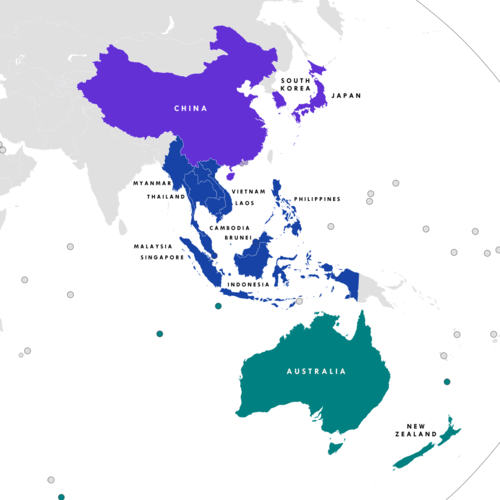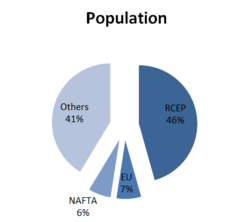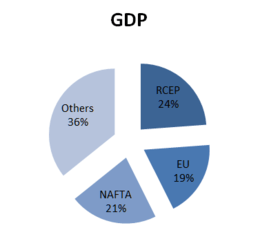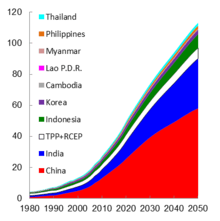Regional Comprehensive Economic Partnership
The Regional Comprehensive Economic Partnership (RCEP) is a proposed free trade agreement in the Indo-Pacific region between the ten member states of the Association of Southeast Asian Nations (ASEAN), namely Brunei, Cambodia, Indonesia, Laos, Malaysia, Myanmar, the Philippines, Singapore, Thailand, and Vietnam, and five of ASEAN's FTA partners—Australia, China, Japan, New Zealand, and South Korea. India, which is also ASEAN's FTA partner, opted out of RCEP in November 2019.[1]
| Type | Free Trade Agreement under negotiation |
|---|---|
| Signed | not signed |
| Negotiators | 15 |
RCEP negotiations were formally launched in November 2012 at the ASEAN Summit in Cambodia.[2] In 2018, the 16 negotiating parties accounted for about half of the world's population and 39% of the world's GDP.[3] Without India, the 15 negotiating parties account for 30% of the world's population and just under 30% of the world's GDP.[4]
Membership

The arrangement will also be open to any other external economic partners, such as nations in Central Asia and remaining nations in South Asia and Oceania.[5]
Negotiating parties
- Ten members of ASEAN
- Three additional East Asian members of ASEAN Plus Three
- Two additional members of ASEAN Plus Six
Basic indicators of the 15 negotiating parties
| Flag | Country | Capital | Area (km²) | Population | Nominal GDP (millions of US$) | GDP per cap. (Nominal, US$) | PPP GDP (millions of Int$) | GDP per cap. (PPP, Int$) | HDI | Currency | Official languages | Leaders |
|---|---|---|---|---|---|---|---|---|---|---|---|---|
| Australia Commonwealth of Australia | Canberra | 7,692,024 | 24,419,900 | 1,482,282 | 55,215 | 1,296,075 | 50,817 | 0.939 | Australian dollar ($) (AUD) | None National and de facto: English | Monarch: Elizabeth II Governor-General: David Hurley Prime Minister: Scott Morrison | |
| Brunei Nation of Brunei, the Abode of Peace Negara Brunei Darussalam | Bandar Seri Begawan | 5,765 | 417,200 | 11,991 | 28,740 | 33,756 | 76,567 | 0.865 | Brunei dollar ($) (BND) | Malay | Monarch: Hassanal Bolkiah | |
| Cambodia Kingdom of Cambodia Preăh Réachéanachâk Kâmpŭchéa | Phnom Penh | 181,035 | 15,626,444 | 24,307 | 1,308 | 69,884 | 4,022 | 0.563 | Cambodian riel (៛) (KHR) | Khmer | Monarch: Norodom Sihamoni Prime Minister: Hun Sen | |
| China People's Republic of China Zhōnghuá Rénmín Gònghéguó | Beijing | 9,596,961 | 1,382,580,000 | 14,342,903 | 10,262 | 25,102,916 | 18,158 | 0.738 | Renminbi (Chinese yuan, ¥) (CNY) | Standard Chinese written in simplified characters see also: Languages of China | General Secretary and President: Xi Jinping Premier: Li Keqiang | |
| Indonesia Republic of Indonesia Republik Indonesia | Jakarta | 1,910,931 | 263,510,000 | 1,092,138 | 3,895 | 3,481,107 | 12,432 | 0.689 | Indonesian rupiah (Rp) (IDR) | Indonesian see also: Languages of Indonesia | President: Joko Widodo | |
| Japan Nippon-koku | Tokyo | 377,930 | 126,760,000 | 5,063,129 | 38,281 | 5,545,884 | 42,860 | 0.903 | Japanese yen (¥) (JPY) | Japanese | Monarch: Naruhito Prime Minister: Shinzō Abe | |
| Laos Lao People's Democratic Republic Sathalanalat Paxathipatai Paxaxon Lao | Vientiane | 236,800 | 6,492,400 | 18,674 | 2,051 | 53,626 | 6,115 | 0.586 | Lao kip (₭) (LAK) | Lao | General Secretary and President: Bounnhang Vorachith | |
| Malaysia Malaysia | Kuala Lumpur Putrajaya (administrative) | 330,803 | 32,019,500 | 340,923 | 9,623 | 988,993 | 28,636 | 0.789 | Malaysian ringgit (RM) (MYR) | Malaysian see also: Languages of Malaysia | Monarch: Abdullah Prime Minister: Muhyiddin Yassin | |
| Myanmar (Burma) Republic of the Union of Myanmar Pyidaunzu Thanmăda Myăma Nainngandaw | Naypyidaw | 676,578 | 54,836,000 | 74,002 | 1,374 | 362,969 | 6,360 | 0.556 | Burmese kyat (K) (MMK) | Burmese see also: Languages of Myanmar | President: Win Myint State Counsellor: Aung San Suu Kyi | |
| New Zealand Aotearoa | Wellington | 270,467 | 4,786,710 | 215,172 | 41,107 | 195,103 | 38,706 | 0.915 | New Zealand dollar ($) (NZD) | English Māori | Monarch: Elizabeth II Governor-General: Patsy Reddy Prime Minister: Jacinda Ardern | |
| Philippines Republic of the Philippines Republika ng Pilipinas | Manila | 300,000 | 103,874,000 | 357,792 | 3,102 | 951,224 | 8,270 | 0.682 | Philippine peso (₱) (PHP) | Filipino (Tagalog) English | President: Rodrigo Duterte | |
| Singapore Republic of Singapore Republik Singapura Xīnjiāpō Gònghéguó Ciṅkappūr Kuṭiyaracu | Singapore (city-state) | 719 | 5,607,300 | 316,872 | 51,431 | 537,447 | 90,724 | 0.925 | Singapore dollar ($) (SGD) | Malay English Mandarin Tamil see also: Languages of Singapore | President: Halimah Yacob Prime Minister: Lee Hsien Loong | |
| South Korea Republic of Korea Daehan Minguk | Seoul | 100,210 | 51,446,201 | 1,597,392 | 29,114 | 2,127,164 | 39,446 | 0.901 | South Korean won (₩) (KRW) | Korean | President: Moon Jae-in Prime Minister: Chung Sye-kyun | |
| Thailand Kingdom of Thailand Ratcha-anachak Thai | Bangkok | 513,120 | 68,298,000 | 466,623 | 6,265 | 1,296,095 | 17,749 | 0.740 | Thai baht (฿) (THB) | Thai | Monarch: Vajiralongkorn Prime Minister: Prayut Chan-o-cha | |
| Vietnam Socialist Republic of Vietnam Cộng hòa Xã hội chủ nghĩa Việt Nam | Hanoi | 331,699 | 96,208,984 | 234,688 | 2,305 | 697,752 | 6,925 | 0.683 | Vietnamese đồng (₫) (VND) | Vietnamese | General Secretary and President: Nguyễn Phú Trọng Prime Minister: Nguyễn Xuân Phúc |
Value


RCEP potentially includes more than 3 billion people or 45% of the world's population, and a combined GDP of about $21.3 trillion, accounting for about 40 percent of world trade, though India's decision to not join RCEP has reduced the potential impact of RCEP significantly.[7] The combined GDP of potential RCEP members surpassed the combined GDP of Trans-Pacific Partnership (TPP) members in 2007. Continued economic growth, particularly in China, India and Indonesia could see total GDP in RCEP grow to over $100 trillion by 2050, roughly double the project size of TPP economies.[8]

On 23 January 2017, United States President Donald Trump signed a memorandum that stated withdrawal of the country from the TPP, a move which was seen to improve the chances of success for RCEP.[9]
2019 Media Statement
The 7th Regional Comprehensive Economic Partnership (Rcep) Intersessional Ministerial Meeting, 2 March 2019, Siem Reap, Joint Media Statement:
- The Ministers from the 16 RCEP Participating Countries (RPCs) attended the seventh RCEP Intersessional Ministerial Meeting held on 2 March 2019 in Siem Reap, Cambodia. The Meeting was opened by Samdech Akka Moha Sena Padei Techo HUN SEN, Prime Minister of the Kingdom of Cambodia and was chaired by H.E. Chutima Bunyapraphasara, Deputy Minister of Commerce, Acting Minister of Commerce of Thailand, reviewed the developments since the 2nd RCEP Summit on 14 November 2018 in Singapore, particularly the outcomes of the 2nd Special TNC Meeting held on 25–26 January 2019 in Jakarta, Indonesia, and the 25th RCEP Trade Negotiating Committee (TNC) Meeting and Related Meetings held on 19–28 February 2019 in Bali, Indonesia.
- The Ministers recalled the Leaders’ determination to conclude a modern, comprehensive, high quality, and mutually beneficial RCEP in 2019, and resolved to exert utmost effort to achieve this target. They commended the RCEP Trade Negotiating Committee (TNC) for the good progress made to date on both market access and text-based negotiations but at the same time recognized that more work still needs to be done to advance both aspects of the negotiations. The Ministers urged all RPCs to address specific sensitivities while working towards achieving commercially meaningful and balanced outcomes. The Ministers remained confident that with collective commitment and pragmatism, the chapters and annexes that would comprise the RCEP Agreement can be concluded soon. The Ministers reiterated that it is the collective responsibility of all RPCs to ensure progress by overcoming negotiation challenges and finding solutions to the remaining issues through constructive engagement.
- To ensure that progress is made towards meeting the Leaders’ mandate for conclusion in 2019, the Ministers agreed to intensify engagement for the remainder of the year, including by convening more intersessional meetings. The Ministers agreed to meet next at the 8th RCEP Intersessional Ministerial Meeting to be held in August 2019 after the 27th RCEP TNC Meeting and Related Meetings.[10]
History
2011
- August 2011,
East Asia Summit Economic Ministers welcomed a Chinese and Japanese joint 'Initiative on Speeding up the Establishment of EAFTA and CEPEA'.[11]
- During the 19th ASEAN Summit held 14–19 November 2011, the Regional Comprehensive Economic Partnership (RCEP) was introduced.[12]
2012
- The 44th ASEAN Economic Ministers (AEM) Meeting and Related Meetings were held in Siem Reap, Cambodia, 25 August – 1 September 2012.[13]
- Leaders at the 21st ASEAN Summit held 18–20 November 2012 in Phnom Penh, Cambodia endorsed the framework of RCEP and announced the launch of their negotiations.[14]
2013
- The first round of RCEP negotiation was held on 9–13 May 2013 in Brunei[6]
- The second round of RCEP negotiation was held on 23–27 September 2013 in Brisbane, Australia.[15]
2014
- The third round of RCEP negotiation was held on 20–24 January 2014 in Kuala Lumpur, Malaysia.[16]
- The fourth round of RCEP negotiation was held on 31 March – 4 April 2014 in Nanning, China.[17]
- The fifth round of RCEP negotiation was held on 21–27 June 2014 in Singapore.[18]
- The sixth round of RCEP negotiation and related meetings was held on 1–5 December 2014 in New Delhi, India.[19] The Indians held an outreach event with their business community to educate them on the goals of RCEP. The Japanese asked to set up a workshop on e-Commerce.
2015
- The seventh round of RCEP negotiation was held on 9–13 February 2015 in Bangkok, Thailand. An expert group on electronic commerce met during this round. The Asian Trade Centre (based in Singapore) submitted a proposal regarding an e-Commerce chapter and gave a presentation on the paper.[20]
- The eighth round of RCEP negotiation was held on 5–13 June 2015 in Kyoto, Japan.[21]
- The ninth round of RCEP negotiation was held on 3–7 August 2015 in Nay Pyi Taw, Myanmar.[22]
- The tenth round of RCEP negotiation was held on 12–16 October 2015 in Busan, South Korea. The meetings took place at BEXCO (Busan's Convention and Exhibition Centre). This round included the first region wide stakeholder meeting (organized by the Singapore-based Asian Trade Centre) which involved an informal meeting between government officials and business representatives over lunch followed by an afternoon seminar focused on what RCEP can do to help business operate in the e-Commerce space.[23]
2016
- The eleventh round of RCEP negotiation was held on 14–19 February 2016 in Bandar Seri Begawan, Brunei.[24]
- The twelfth round of negotiation of RCEP was held on 17–29 April 2016 in Perth, Australia.[25]
- The thirteenth round of RCEP negotiation was held on 12–18 June 2016 in Auckland, New Zealand.[26]
- The fourteenth round of RCEP negotiation was held on 15–18 August 2016 in Vietnam.[27]
- The fifteenth round of RCEP negotiation was held on 11–22 October 2016 in Tianjin, China.[28]
- The sixteenth round of negotiations of RCEP was held on 6–10 December 2016 in Tangerang, Indonesia.[29]
2017
- The seventeenth round of negotiations of RCEP was held in Kobe, from 27 February – 3 March 2017 in Kobe, Japan.[30]
- The eighteenth round of RCEP negotiation was held on 8–12 May 2017 in Manila, Philippines.[31]
- The nineteenth round of RCEP negotiation was held on 24–28 July 2017 in Hyderabad, India.[32]
- The twentieth round of RCEP negotiation was held on 17–28 October 2017 in Incheon, Korea.[33]
- The first RCEP summit was held on 14 Nov 2017 in Manila, Philippines.[34][35]
2018
- The twenty-first round of RCEP negotiation was held on 2–9 February 2018 in Yogyakarta, Indonesia.[36]
- The twenty-second round of RCEP negotiation was held from 28 April – 8 May 2018 in Singapore.[37]
- The twenty-third round of RCEP negotiation was held on 17–27 July 2018 in Bangkok, Thailand.[38]
- August–October 2018, a series of ministerial meeting in Singapore and Auckland.[39]
- The twenty-fourth round of RCEP negotiation was held on 18–27 October 2018 in Auckland, New Zealand.[40]
- 14 November 2018, a leaders' summit in Singapore is scheduled.[41][42]
2019
- The twenty-five round of RCEP negotiations was held from February 19 to 28 in Bali, Indonesia from February.[43]
- 2 March 2019, a ministerial meeting of RCEP trade ministers held in Cambodia. The ministers agreed to intensify engagement for the remainder of the year (including by convening more inter-sessional meetings).[44]
- Senior officials will hold inter-sessional meetings starting 24 May 2019 in Bangkok, Thailand to iron out issues pertaining to the goods and services sector.[45]
- The twenty-sixth round of RCEP negotiations was held on 3 July 2019 in Melbourne, Australia.[46]
- The twenty-seven round of RCEP negotiations was held on Zhengzhou, China from 22 to 31 July 2019.[47]
- 2–3 August 2019, a ministerial meeting of RCEP trade ministers held in Beijing, China.[48]
- 3rd RCEP summit is held once again on 31 October – 3 Nov 2019 in Thailand with 35th ASEAN summit on same day.
- The twenty-eight round of RCEP negotiations was held in Danang, Vietnam from September 19 to 27 2019.[49]
- India opts out of RCEP on 4 November 2019 in ASEAN+3 summit, citing, according to its view, the adverse impact the deal would have on its citizens.[50] In light of India's departure, Japan and the PRC called on India to rejoin the partnership.[51][52]
2020
- The twenty-nine round of RCEP negotiations was held from April 20 to 24 2020 as a video conference, due to the current situation regarding COVID-19 disease. [53]
- On April 30, 2020, Joint Statement of the 29th RCEP Trade Committee (RCEP TNC) Meeting was issued.[54]
- The thirtith round of RCEP negotiations was held from May 15 to 20 2020 as a video conference, due to the current situation regarding COVID-19 disease. [55]
- The tenth RCEP Inter-sessional Ministerial Meeting held in the form of a video conference on June 23. [56]The officials reiterated their determination to sign the RCEP at the fourth RCEP Summit in November.
- The thirty-first round of RCEP negotiation was held on July 9 as a video conference, due to the current situation regarding COVID-19 disease. [57]
Criticism
RCEP has been criticized by free culture activists for containing "quite simply the worst provisions on copyright ever seen in a trade agreement."[58] Global health care activists have criticized the agreement for potentially forcing India to end its inexpensive supply of generic medications to poor countries.[59] In November 2019, India pulled out of the deal primarily due to concerns of dumping of manufactured goods from China and agricultural and dairy products from Australia and New Zealand, potentially affecting its own domestic industrial and farming sectors.[60]
See also
- Comprehensive Economic Partnership for East Asia (CEPEA)
- Comprehensive and Progressive Agreement for Trans-Pacific Partnership (CPTPP)
- East Asian Community
- East Asia Summit
- South Asian Free Trade Area
- Free Trade Area of the Asia-Pacific (FTAAP)
- Rules of Origin
- Market access
- Free-trade area
- Tariffs
References
- "India decides to opt out of RCEP, says key concerns not addressed". The Economic Times. 5 November 2019.
- "RCEP: Challenges and Opportunities for India, 25 July 2013, RSIS, Singapore" (PDF). rsis.edu.sg. Archived from the original (PDF) on 30 December 2013. Retrieved 24 April 2018.
- Stefani Ribka/Linda Yulisman (7 December 2016). "RCEP talks speed up amid TPP failure".
- "India stays away from RCEP talks in Bali". Nikkei Asian Review. Jakarta. 4 February 2020. Retrieved 4 February 2020.
- "What is the Regional Comprehensive Economic Partnership (RCEP)? Ministry of Trade and Industry Singapore November 2012" (PDF).
- "Regional Comprehensive Economic Partnership (RCEP) Joint Statement The First Meeting of Trade Negotiating Committee". 10 May 2013. Archived from the original on 19 February 2015.
- Rohit Sinha and Geethanjali Nataraj (30 July 2013). "Regional Comprehensive Economic Partnership (RCEP): Issues and Way Forward". thediplomat.com.
- "Understanding and applying long-term GDP projections". eaber.org. Retrieved 17 June 2016.
- Reichert, Corinne. "Trump dumping Trans-Pacific Partnership". ZDNet.com.
- "The 7Th Regional Comprehensive Economic Partnership (RCEP) Intersessional Ministerial Meeting, 2 March 2019, Siem Reap, Cambodia, Joint Media Statement" (PDF).
- "Background to the Regional Comprehensive Economic Partnership (RCEP) Initiative". Retrieved 2 November 2019.
- "Nineteenth ASEAN Summit, Bali, Indonesia | 14–19 November 2011". Archived from the original on 29 June 2013.
- "ASEAN plus 6 agree to start RCEP talks – CCTV News". english.cntv.cn.
- "Announcement of the Launch of Negotiations for the Regional Comprehensive Economic Partnership (RCEP) Ministry of Economy, Trade and Industry Japan 20 November 2012". Archived from the original on 14 October 2013.
- "Australia hosts second round of Regional Comprehensive Economic Partnership (RCEP) Negotiations in Brisbane". Archived from the original on 3 October 2013.
- "Media Release: 3rd Meeting of the RCEP Trade Negotiation Committee 20–24 January 2014, Kuala Lumpur, Malaysia". The Ministry of International Trade and Industry, Malaysia. 27 January 2014. Archived from the original on 22 February 2014.
- "Fourth Round of Negotiations for Regional Comprehensive Economic Partnership (RCEP)". Joint press release of Japanese Ministry of Economy, Trade, and Industry with the Ministry of Foreign Affairs. 4 April 2014.
- "5th negotiation of Regional Comprehensive Economic Partnership Agreement (RCEP)". Ministry of Industry and Trade of the Socialist Republic of Vietnam. 30 June 2014. Archived from the original on 22 December 2015. Retrieved 20 December 2015.
- "Department of commerce". commerce.nic.in.
- "Seventh Round of Negotiations for Regional Comprehensive Economic Partnership (RCEP) to be held in Thailand". Ministry of Foreign Affairs of Japan. 5 February 2015.
- "Eighth Round of Negotiations for Regional Comprehensive Economic Partnership (RCEP) to be held in Kyoto". Ministry of Foreign Affairs of Japan. 4 June 2015.
- "Ninth Round of Negotiations for Regional Comprehensive Economic Partnership (RCEP) to be held in Myanmar". Ministry of Foreign Affairs of Japan. 30 July 2015.
- "Tenth Round of Negotiations for Regional Comprehensive Economic Partnership (RCEP) to be held in Korea". Ministry of Foreign Affairs of Japan. 8 October 2015.
- "China FTA Network".
- "The 12th Round of Negotiation of Regional Comprehensive Economic Partnership (RCEP) Held in Perth".
- "Thirteenth Round of Negotiations for Regional Comprehensive Economic Partnership (RCEP) to be held in Auckland". Ministry of Foreign Affairs of Japan. 8 June 2016.
- "14th Round of Negotiations for Regional Comprehensive Economic Partnership(RCEP)". Ministry of Foreign Affairs of Japan. 10 August 2016.
- "The 14th Round of Negotiation of Regional Comprehensive Economic Partnership Held in Ho Chi Minh City, Vietnam". english.mofcom.gov.cn.
- "16th Round of Negotiations for Regional Comprehensive Economic Partnership (RCEP)". Ministry of Foreign Affairs of Japan. 1 December 2016.
- "17th Round of Negotiations for Regional Comprehensive Economic Partnership(RCEP)". Ministry of Foreign Affairs of Japan. 22 February 2017.
- http://www.dti.gov.ph/media/latest-news/10511-asean-fta-partners-meet-for-rcep-in-manila
- S, Arun (27 July 2017). "India pressed to open up procurement". The Hindu.
- "20th Round of Negotiations for Regional Comprehensive Economic Partnership (RCEP)". Ministry of Foreign Affairs of Japan. 12 October 2017.
- "Najib: RCEP likely to be signed in Nov 2018". 15 November 2017.
- "Now push RCEP, Abe-san". The Straits Times. 24 November 2017.
- "21st Round of Negotiations for Regional Comprehensive Economic Partnership (RCEP)". Ministry of Foreign Affairs of Japan. 29 January 2018.
- "22nd Round of Negotiations for Regional Comprehensive Economic Partnership (RCEP)". Ministry of Foreign Affairs of Japan. 25 April 2018.
- "23th Round of Negotiations for Regional Comprehensive Economic Partnership (RCEP)". Ministry of Foreign Affairs of Japan. 12 July 2018.
- Livemint (5 September 2018). "India wins key concession on services at RCEP Singapore Ministerial".
- "23th Round of Negotiations for Regional Comprehensive Economic Partnership (RCEP)". Ministry of Foreign Affairs of Japan. 16 October 2018.
- "Regional Comprehensive Economic Partnership (RCEP) Summit". Ministry of Foreign Affairs of Japan. 14 November 2018.
- South China Morning Post (3 September 2018). "US trade war and Japan push raise prospects for China-backed Asia free-trade deal".
- "25th Round of Negotiations for Regional Comprehensive Economic Partnership (RCEP)". Ministry of Foreign Affairs of Japan. 14 February 2019.
- "Seventh Regional Comprehensive Economic Partnership (RCEP) Ministerial Meeting". Ministry of Foreign Affairs of Japan. 1 March 2019.
- https://www.business-standard.com/article/pti-stories/senior-officials-of-rcep-countries-to-meet-in-bangkok-on-may-24-119042200470_1.html
- "26th Round of Negotiations for Regional Comprehensive Economic Partnership (RCEP)". Ministry of Foreign Affairs of Japan. 18 June 2019.
- "27th Round of Negotiations for Regional Comprehensive Economic Partnership (RCEP)". Ministry of Foreign Affairs of Japan. 19 July 2019.
- "Eighth Regional Comprehensive Economic Partnership (RCEP) Intersessional Ministerial Meeting". Ministry of Foreign Affairs of Japan. 1 August 2019.
- "28th Round of Negotiations for Regional Comprehensive Economic Partnership (RCEP)". Ministry of Foreign Affairs of Japan. 17 September 2019.
- "India decides to opt out of RCEP, says key concerns not addressed". The Economic Times. 4 November 2019. Retrieved 4 November 2019.
- https://www.washingtonpost.com/business/whats-the-rcep-and-what-happened-to-the-tpp/2019/11/04/2c1a5a8c-ff38-11e9-8341-cc3dce52e7de_story.html
- "India's exit from RCEP leaves Japan and China unsure about future direction of free trade pact". The Japan Times Online. 5 November 2019. ISSN 0447-5763. Retrieved 10 November 2019.
- "29th Round of Negotiations for Regional Comprehensive Economic Partnership (RCEP)". Ministry of Foreign Affairs of Japan. 16 April 2020.
- "Joint Statement of the 29th Regional Comprehensive Economic Partnership Trade Negotiating Committee (RCEP TNC) Meeting". Ministry of Foreign Affairs of Japan. 30 April 2020.
- "30th Round of Negotiations for Regional Comprehensive Economic Partnership (RCEP)". Ministry of Foreign Affairs of Japan. 13 May 2020.
- "RCEP members determined to sign deal in November". National ASEAN 2020 Committee. 13 May 2020.
- "31st Round of Negotiations for Regional Comprehensive Economic Partnership (RCEP)". Ministry of Foreign Affairs of Japan. 7 July 2020.
- "RCEP: The Other Closed-Door Agreement to Compromise Users' Rights". Electronic Frontier Foundation. 20 April 2016. Retrieved 28 April 2016.
- Chandran, Nyshka (12 January 2017). "China-backed trade deal may not gain from TPP's loss. Blame India". CNBC.
- "India decides to opt out of RCEP, says key concerns not addressed". 5 November 2019. Retrieved 5 November 2019.
External links
- Regional Comprehensive Economic Partnership (RCEP), ASEAN
- Market Access Map (A free tool developed by International Trade Centre, which identify customs tariffs, tariff rate quotas, trade remedies, regulatory requirements and preferential regimes applicable to products, including Regional Comprehensive Economic Partnership)
- Rules of Origin Facilitator (A free tool jointly developed by International Trade Centre, World Trade Organization and World Customs Organization which enables traders to find specific criteria and general origin requirements applicable to their products, understand and comply with them in order to be eligible for preferential tariffs. The tool is very useful for traders who want to gain benefit from Regional Comprehensive Economic Partnership)
- Regional Comprehensive Economic Partnership page on the Rules of Origin Facilitator, with member countries' status and access to legal documents.